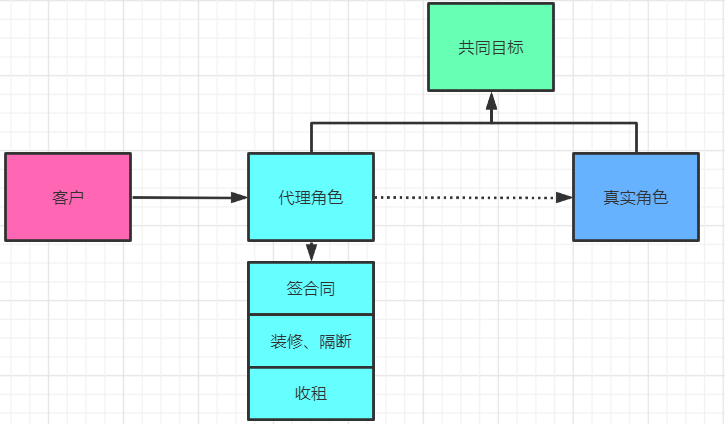1、代理模式()

- 抽象角色:共同的任务,都要去做的事
- 真实角色:被代理的角色
- 代理角色:代理真实的对象并做附属操作
- 客户:访问代理对象的人
- 接口
public interface Rent { public void rent(); }
- 真实角色
public class House implements Rent { public void rent() { System.out.println("房东出租房子"); } }
- 代理角色
public class Proxy implements Rent { private House house; public Proxy() { } public Proxy(House house) { this.house = house; } public void rent() { //house.rent(); System.out.println("中介出租房子"); hetong(); fare(); } public void fare(){ System.out.println("收费"); } public void hetong(){ System.out.println("签合同"); } }
- 客户访问代理角色
@org.junit.Test public void test02(){ House house=new House(); Proxy proxy=new Proxy(house); proxy.rent(); }
好处,优点:
-
可以使真实角色的操作更加纯粹!不去关注公共的业务
-
公共交给代理角色,实现业务的分工
-
公共业务发生拓展时,方便集中管理
缺点:
- 一个真实对象就需要一个代理角色,代码翻倍
2、动态代理【重点】
1、代理工具类
import java.lang.reflect.InvocationHandler; import java.lang.reflect.Method; import java.lang.reflect.Proxy; class InvocationHandlerProxy implements InvocationHandler { private Object target; public void setTarget(Object target) { this.target = target; } //生成得到代理类 public Object getProxy(){ return Proxy.newProxyInstance(this.getClass().getClassLoader(),target.getClass().getInterfaces(),this); } //处理代理实例,并返回结果 public Object invoke(Object proxy, Method method, Object[] args) throws Throwable { //实现接口里的 对应方法,方法名通过传递args进来 Object result = method.invoke(target, args); return result; } }
2、实际操作
public class Client { public static void main(String[] args) { //真实角色 House house=new House(); InvocationHandlerProxy pih = new InvocationHandlerProxy(); //传入要获取的对象 pih.setTarget(house); //获取代理对象 Rent rent = (Rent) pih.getProxy(); rent.rent(); } }